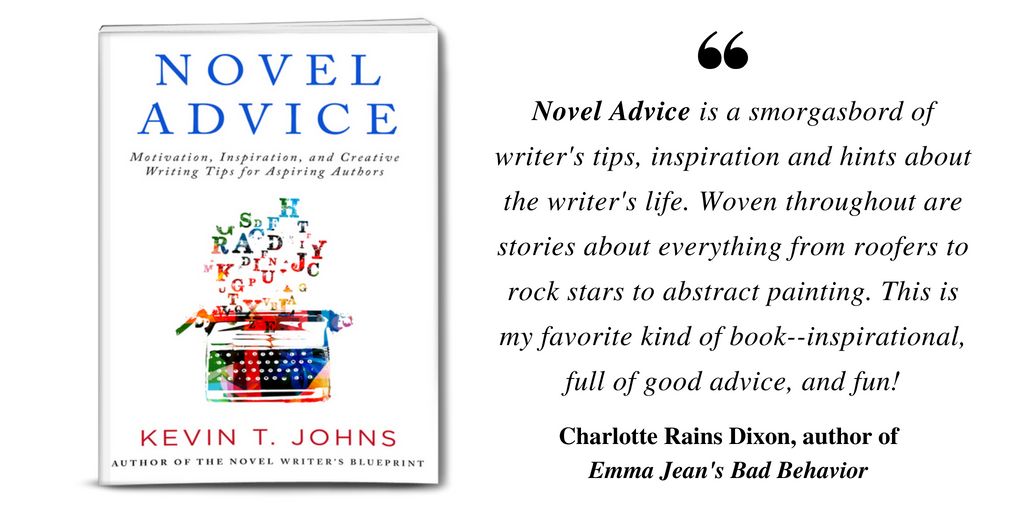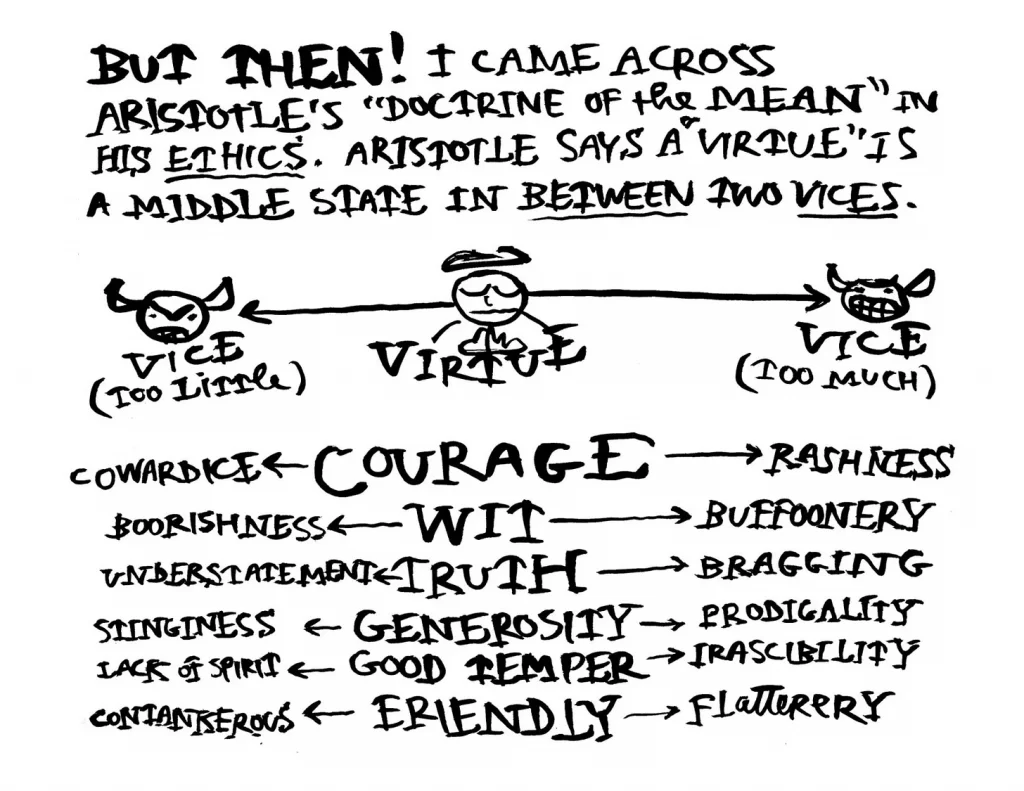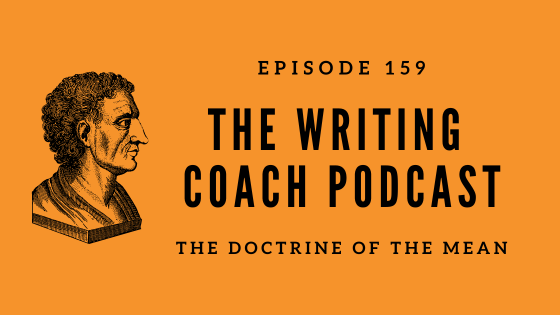In episode 159 of The Writing Coach podcast, I explore Aristotle’s “Doctrine of the Mean,” and how it can help us understand why both living a virtuous life and writing a fantastic book are so difficult to achieve.
Listen to the episode or read the transcript below:
The Writing Coach Episode #159 Show Notes
Get Kevin’s FREE book: NOVEL ADVICE: MOTIVATION, INSPIRATION, AND CREATIVE WRITING TIPS FOR ASPIRING AUTHORS.

The Writing Coach Episode #159 Transcript
Podcast: Play in new window | Download
Subscribe: Apple Podcasts | RSS
Hello, beloved listeners and welcome back to the writing coach podcast. It is your host, as always, writing coach, Kevin T. Johns here.
Do you have a burning desire to bring your book idea to life but find yourself struggling to create a structured and compelling outline? Have you ‘pantsed’ or ‘discovery wrote’ your way into a manuscript, only to find yourself unable to complete it? Are you a published author looking for a quicker and more replicable way to plan your stories? If so, I’m thrilled to let you know that the latest edition of Story Plan Intensive, has just opened its doors. Story Plan is my four-week immersive experience designed to empower and guide you toward crafting an excellent outline for your book in 30 days or less. And the best part about the program is that it is completely free. So to get signed up for Story Plan Intensive, summer 2023 edition, head on over to www.kevintjohns.com/story-plan.
Now, when I first started my coaching business a decade ago, I was new to business completely. I had been a published author, and it was in publishing my books that I became aware of my lack of knowledge of marketing, of sales, of anything like that. And so I joined a bunch of coaching programs and took a million courses and all these things on building a small business or an independent business. And one of the things that one of the coaches said, on a coaching call, I think it was that always stuck with me was he said, “Welcome to the hard part. PS, it’s all the hard part.” I think it stuck with me because it applies not just to building a business or even just to writing a book, but to life itself. It’s not easy.
I’m working with the client right now, (Mikey, if you’re out there listening, “Hey, buddy!”) we’re working on a book, and he is a Buddhist reverend. And so we’re talking a lot about suffering and dealing with suffering and how one of the biggest problems in life, it’s these expectations we create for ourselves that things are going to go easy or that at some point, things are all going to fall together perfectly. And the stars are going to align and everything’s going to go right for us.
Or the idea that someone is going to pick us. We’re taught to sit around waiting for someone to recognize our genius and pick us out of the crowd and turn us into stars. But the reality is, anything you get in life, you’re getting through hard work, and you’re doing most of it yourself. And hopefully, you’ve got a team of people and friends and community and coaches supporting you. But none of it’s easy.
And so that’s what we’re going to talk about on today’s episode is the concept of why writing a great book is difficult. Why even though writers who have written great books before follow up with duds are why you have a favourite author and a lot of their books you love but some of them, you just don’t like as much what happened with those books. It’s not that the author forgot how to write a book, they know how to write a book, but writing a book that people love is difficult.
And I think one of the reasons why it’s so difficult was recently touched on by Austin Kleon. He’s an author and an artist and he has a great weekly email he sends out on Fridays. I always look forward to his Friday emails where he lists 10 things that he was thinking about that week or that he was working on or that he listened to or that he watched. I highly recommend checking out his newsletter, but also getting his books. He has a trilogy of books for artists and writers about creating and showing your work. Anyway, in this week’s newsletter, he was talking about hanging out with Ryan Holiday.
Ryan Holiday is a really successful author who’s written several books about stoicism over the last couple of years. And it’s funny because he’s really known as the stoic guy now. If anyone talks about Ryan Holiday, that’s the context they’re talking about him these days. But it’s funny, a very long time ago, God 10 years ago or something, I remember being at a bookstore and seeing a book called, Trust Me, I’m Lying: Confessions of a Media Manipulator by Ryan Holiday. And I just thought the cover of the book looked badass. And I thought the title was intriguing. And so I got that book and I read it. And it was really an eye-opener in terms of how the internet works.
I was one of the head folks and founders of an online magazine, (Cult)ure Magazine, a very long time ago. But when we were running that magazine, we definitely didn’t really understand how the internet works and how advertising works and how clicks work and all of that. And so, Ryan Holiday’s book really opened my eyes to a lot of that behind-the-scenes stuff of how the internet works, but also just how book marketing works and publicity and all of these things.
I think at that time Holiday was also working with Tim Ferriss a bit . . . I don’t know if he wrote an article for Tim Ferriss’s blog or what but, anyway, when I think of Ryan Holiday, I think of the interesting marketing expert guy who ran in circles with Tim Ferriss, but these days, people think of him as the stoic guy.
And so back to Austin Kleon. He was talking about hanging out with Ryan Holiday. And he was talking about how the stoic principles of virtue he could never get on board with. Austin Kleon was saying, without cowardly procrastination I wouldn’t get any writing done. And he was talking about envy and anger and all of these vices that are the opposite of virtuous feelings and saying they are what drives his art. So Kleon and Holiday were talking and Holiday drew Kleon’s attention to Aristotle’s “Doctrine of the Mean” from his book Nicomachean Ethics.
And what Aristotle says is that virtue is a state of being that exists in the middle between two vices. And so those two vices are the vice of too little on one end of the spectrum, and too much on the other. So in between too much and too little, is virtue.
Austin Kleon made a little illustration that he shared in his newsletter where he showed exactly how this concept works:

And he said on one end is cowardice you know, too little. On the other end is rashness, too much bravery and what’s in between cowardice and rashness, courage. Another example is boorishness on one side and buffoonery on the other. And what’s in between those two? Wit, the virtue of wit, the virtue of courage, the virtue of truth, where does that exist? Well, on one end is an understatement, too little, on the other end is bragging, too much. On one end of the spectrum is stinginess on the other end is practicality. And in between those is generosity. And then another cantankerous on one end, flattery on the other, and friendliness right in the middle.
The point being here, this is why life is hard. And this is why being a good person is hard. Because it’s not just about embracing a series of virtues and then just living them; it’s about trying to find that doctrine of the mean, it’s about trying to find that middle ground between not understating things but not bragging about them, finding that middle ground of truth.
And that isn’t always easy.
I want to take this concept, this doctrine of the mean and apply it to some writing concepts. The first of which is something Chuck Palahniuk talks about in his excellent book on writer’s craft, Consider This: Moments in My Writing Life After Which Afterthing was Different. Palahniuk talks about a story structure that he feels always works in Western storytelling.
Now, what he says is that in this classic story structure, there’s a good boy or a good girl who always follows orders and is shy and agreeable. Then there’s a rebel character who bullies and breaks the rules and brashley hogs the spotlight, then there’s a third character who’s a quiet and thoughtful character who acts as the narrator, relating the story to the reader. So that’s the setup.
Now, what’s the payoff? The passive character commits suicide. This usually prompts the execution of the rebel and the thoughtful witness leaves the story having grown wiser by witnessing the fate of the other two characters, and is ready to relay this cautionary tale to the world.
D you see what’s going on here in the controlling idea of this story type? It’s the doctrine of the mean, don’t be too passive or you’ll end up killing yourself. Don’t be too pushy or you’ll be executed. Watch and learn from the extremes of other people so that you can find the doctrine of the mean you can find that middle ground where virtue lies.
Now, that’s one story type where I think this doctrine of the mean applies, but it also applies to writing in general and to the challenges we started this podcast off talking about, the challenges of writing a great book.
In order to write a great book, you’re really a tightrope walker. You are balancing on that beam way up above the audience. And with each step, there’s the potential for falling. We have to walk very carefully across that tightrope. We need to stay in that middle ground.
Where’s the middle ground when it comes to writing a book? Well, there’s genre adherence, we need to be writing in the established genre, and we need to be hitting the conventions of that genre. But if that’s all we do, the story feels boring and trite, it feels like the reader has seen it all before. But if we go in the other direction, and we have no genre, or we’re mashing together a ton of different genres, the reader gets confused. They say, what is this story? Is it a sci-fi? Or is it time traveller? Is it a romance? Or is it a comedy? And so we’re trying to find that middle ground between providing the comfort of the familiar in terms of generic conventions, but also the excitement of the new.
Same thing we think with the formal presentation of the book, we need to formally fall in the tradition of what is considered a book. But if we can do things new and innovative, people are probably going to be excited by that. But if we push things too far, do we even have a book anymore? Maybe we have something like super experimental pros like Gravity’s Rainbow, which nobody reads because it’s too difficult. Or maybe you’ve created a book that folds out into a giant map, and then the map turns into a tent. And it’s like, is this a book anymore? Or is it an art project? We need to find the mean between formal convention and formal experimentation or innovation.
It can even apply just to the simple scene level. Are you providing too much description? In your story? Are you not providing enough description? Are you providing too much narration? Are you not having enough narration? Are you providing too much dialogue? Are you not using enough dialogue? Do you have scenes that are full of too many characters? Or is the whole book just one or two characters?
In all of these things, we’re trying to find that middle ground. We want just the right amount of narrative, we want just the right amount of dialogue, we want just the right amount of characters.
Where this is perhaps the most difficult is finding that middle ground between being too on the nose, and too confusing. And that’s really where people struggle because you’re trying to predict the reader’s reaction to your story. We see this a lot in mysteries or in thrillers and things where we’re dropping little pieces of evidence. And then as an author, we’re trying to make sure that the reader is noticing things or picking up on things, but at the same time, we don’t want to be too obvious about it. Because if we’re too obvious about things, people don’t like it.
How many times have you read a book or heard someone describe a movie and they put it down by saying, “Oh, I saw the ending coming a mile away. I was halfway through the book, and I already knew how it was going to end.” Well, that means the author was too on the nose. But at the same time, if you’re withholding too much information, the narrative can become totally confusing. Or when the big twist happens, the reader feels cheated because they feel like the evidence wasn’t there to allow them to ever have guessed that that is where the story was going to go.
We have this thing called a surprising but inevitable twist or conclusion to the story, and these surprising but inevitable twists require foreshadowing, they require the feeling on the part of the reader that they should have seen this twist coming, but didn’t. And there’s a lot of joy and pleasure that comes from being surprised in that way but not feeling cheated, instead feeling like I should have seen that coming but I didn’t.
This is one of the reasons why writing a great book that everyone loves is so damn hard. It’s the same reason why living a virtuous life is hard. We really aren’t given simple instructions in terms of where to land between the two ends, the two vices of too little and too much. So we’re constantly refining our own instinct or finding our own taste, but also experimenting, and also working with others.
There is a reason why Beta Readers exist. At some point, we have to hand our work to someone and say, “Is this too on the nose? Or is this too confusing? Is this too long? Or is it too short?” Again, it kind of goes back, I suppose to this idea of the solitary writer, which I’m always trying to destroy this idea that someone just sits alone in a cottage and writes their masterpiece, and sends it off. Art is created in a community art is created for people. And sometimes finding that doctrine of the mean, finding that middle ground can only be done with the help of others.
And sometimes we just missed the mark. You know what? That’s okay. I hope that you try to live your life with courage and truth and generosity, but guess what? Sometimes we get stingy, or sometimes we behave rationally, or sometimes our attempts at wit come across as buffoonery. We all make mistakes. Life isn’t easy. And so, do your best. Try to walk that tightrope and try to find that middle ground between the two extremes.
All right, did you miss the Spring of 2023 round of Story Plan Intensive? Well, I got some good news for you. On June 5, 2023, we are kicking off the summer edition and you can sign-up now. This is a four-week program with daily training videos, over 35 videos over the course of the month, weekly homework assignments, and a Facebook community where you can interact with other writers going through the program. It is a program that will get you a rock-solid outline for your next book in 30 days or less. If you want to be part of the summer 2023 edition, head on over to www.kevintjohns.com/story-plan.
That is it for this week. Thank you so much for tuning in. Don’t forget to hit that subscribe button and I will see you on the next episode of The Writing Coach.

